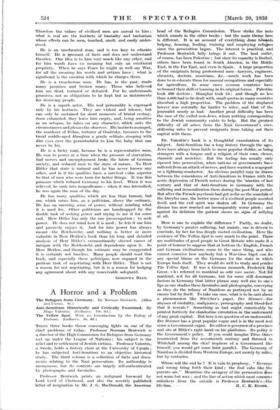A Horror and a Problem
Anti-Semitism Historically and Critically Examined. - By Hugo Valentin. (Oollatiez. Ns. 6d.), The Yellow Spot. With an Introduction by the Bishop of Durham. (Ciollancz. 8s. 6d.) THESE three books throw converging lights on one of the chief problems of today. Professor Norman Bentwich is a director of the High Commission for Refugees from Germany (set up under the League of Nations) ; his subject is the relief and re-settlement of Jewish victims. Professor Valentin, a Swede, holds a history chair at the University of Upsala ; he has subjected Anti-Semitism to an objective historical study. The third volume is a collection of facts and docu-
ments relating to the Nazi persecution.. Its authorship is anonymous, but its contents are largely self-authenticated by photographs and facsimiles.
Professor Bentwich prints an indignant foreword by Lord Cecil of Chelwood. and also the recently published.; letter -of resignation by Mr. J. G. MacDonald, the American
head of the 'Refugees Commission. These strike the note which sounds in the other books ; but the main theme here , is different. It is an account of everything done toNsards helping, housing, feeding, training and employing refugees since the persecution began. The interest is practical, and Professor Bentwich fully brings it out. The best outlet, of course, has been Palestine ; but since its capacity is limited, others have been found in South America, in the Middle East, in the Far East, and even in Spain. A large proportion of the emigrants being professional men—lawyers, engineers, chemists, doctors, musicians, &c.—much work has been done to re-educate them for manual occupations and especially for agriculture. In some cases oversea countries have welcomed their skill or learning in its original forms. Palestine took 400 doctors ; Shanghai took 24 ; and though no less than 4,000 had to be dealt with, small quotas in many countries absorbed a high proportion. The problem of the displaced lawyer was naturally far harder to solve, and that of the journalist nearly as bad. Another great difficulty has been the case of the exiled non-Jews, whom nothing corresponding to the Jewish community exists to help. But the greatest difficulty of all arises from the Nazi Government's ever- stiffening rules to prevent emigrants from taking out their capital with them. -
Dr. Valentin's book is a thoughtful examination of its subject. Anti-Semitism has a long history through the ages. Jews have always been liable to incur popular dislike, as being strangers with a tongue and a religion of their own, clever, clannish and secretive. But the feeling has usually only ripened into persecution, when nations or governments have suffered from an attack of nerves, and have wanted a scapegoat or a lightning-conductor. An obvious parallel may be drawn between the coincidence of Anti-Semitism in France with the acute depression of French nerves during the 'nineties of least century and that of Anti-Semitism in Germany with the suffering and demoralisation there during the post-War period. But after the French psychosis had got as far as the scandals of the Dreyfus case, the better sense of a civilised people asserted itself, and the evil spirit was shaken off. In Germany the disease has now reached an incomparably worse pitch ; and against its delirium the patient shows no signs. of rallying at all.
How is one to explain the difference ? Partly, no doubt, by Germany's greater suffering, but mainly, one is driven to conclude, by her far less deeply rooted civilisation. Here the evidence of The Yellow Spot is very much to the point. There are multitudes of good people in Great Britain who make it a point of honour to suppose that at bottom th:t. English, French and German civilisations come to the same thing, and Who cannot conceive how anybody but a War-time bigot can, fix any special blame on the Germans for the state in which Europe finds itself. They would do well to study and ponder The Yellow Spot. It was a German monarch, Frederick. Great, v h referred to mankind as cette race merle. Not !tor mankind, nit for all Germans, but for some still dominant factors in Germany that bitter phrase may well rise to one's lips as one studies these facsimiles and photographs, conveying as they do the infamy of Nazidom as portrayed not by an enemy but by itself. To take one case, what is to be said about a phenomenon like Streicher's paper, Der Stiirtiter--t,he abysses of credulity, malignancy, pornography and bloodlust that it reveals ? Something as bad might conceivably. be printed furtively for clandestine circulation. in the underworld of any great capital. But here is no question of an underworld. Der Stunner has a great popular vogue and is in the most real sense a Government organ. Its editor is governor of a province and sits at Hitler's right hand on his platforms. Its policy is the Government's policy. If you could imagine Titus Oates resurrected from the seventeenth century and throned in Whitehall among the chief inspirers of a Government like himself, you would get some faint parallel. The Germany of Nazidom is divided from Western Europe, not merely by miles, but by centuries.
Where will the end be ? It is vain to prophesy. " Revenge and wrong bring forth their kind ; the foul cubs like the parents are." Meantime the savagery of the persecution 'does not wane but wax ; and the line of action which most concerns onlookers from the outside is Professor Bentwich's-the


































































 Previous page
Previous page